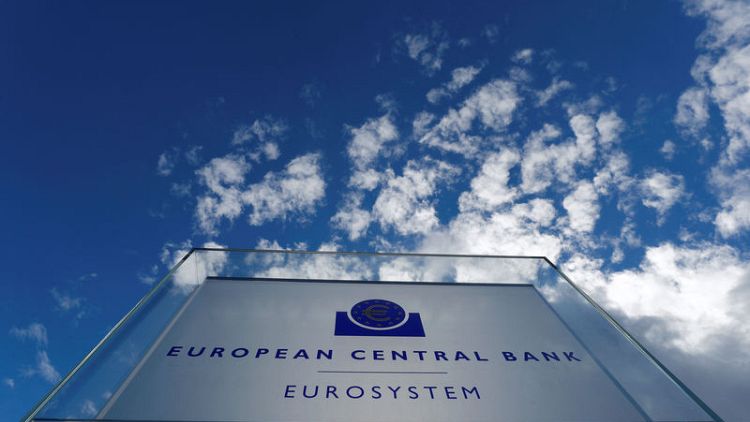By Leigh Thomas
PARIS (Reuters) - As the euro zone's downturn drags on, the lack of coordinated response from the bloc's governments appears to be leaving an uneasy European Central Bank with little choice but to step into the breach again.
As growth has slowed in recent months, the ECB has had to put off plans to return to more normal monetary policy and had to rethink the potential dangers of keeping rates negative for longer than planned.
But with interest rates already at record lows, OECD chief economist Laurence Boone said that euro zone countries should not be looking to the ECB again to revive their economies.
"If downside risks materialise further, governments must act and coordinate fiscal policies, and they must do structural reforms," Boone told a conference at the Bank of France on Thursday.
Germany, France and Italy, the euro zone's three biggest economies, are easing fiscal policy this year, which Barclays said should provide some support to growth.
While Germany is focussed on social payments and some investment, Italy aims to roll out a universal income scheme and France is easing the tax burden by more than 10 billion euros (8.61 billion pounds).
Together, their fiscal easing should add 0.2 percentage points to euro zone growth, bringing it to around 1.2 percent this year, Barclays said in a research note this week
But euro zone countries' budget stimulus is being done largely independently of each other, especially on public investment, which economists say would have the biggest effect.
"Greater public investment across the euro area is needed but is unlikely to materialise, even if economic activity weakens much further," Barclays concluded in a note this week.
GROWTH SHOCKS
IMF chief economist Gita Gopinath warned on Friday that euro zone financial markets would be unable to absorb a future shock in the absence of a more unified banking sector and capital markets.
"In the next crisis, a lot of these issues are going to crop up. Why? Because it continues to be the case that there are fragmented markets," Gopinath said at the conference.
Her boss, IMF chief Christine Lagarde, said the solution would be to agree a shared bank deposit guarantee scheme. But northern countries remain suspicious that the long-proposed plan could leave them on the hook for repayments of deposits in southern countries burdened by bad bank loans.
In the absence of better levers to bolster the euro zone economy, the focus falls on the ECB, which is also contending with inflation slipping away from its 2-percent target despite its already record low interest rates.
Although economists polled by Reuters estimate that data due on Monday will show euro zone inflation remained steady at 1.5 percent in March, weak data from France and Germany increase the chances of a softer reading.
In other data next week, the first Friday of the month will bring all-important payroll data in the United States, with economists on average forecasting the creation of 170,000 jobs after a paltry 20,000 the previous month.
Along with retail sales and ISM business surveys, the data should paint a clearer picture of whether the United States is at risk of joining the euro zone in a more marked slowdown.
(Reporting by Leigh Thomas; Editing by Kevin Liffey)



